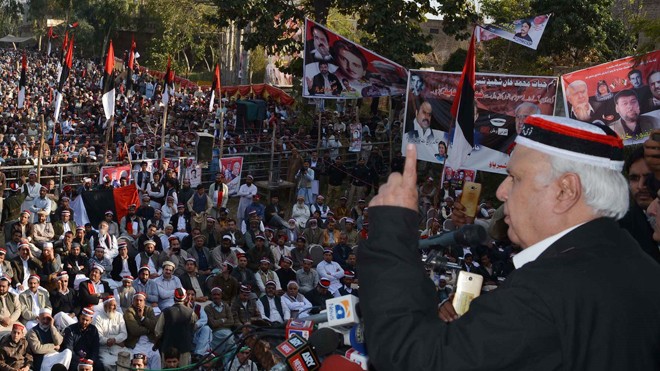
The proposed "Tribal Areas Rewaj Act" will defeat the very idea of mainstreaming Fata

The federal cabinet’s approval of Fata’s merger with Khyber Pakhtunkhwa, the extension of Supreme Court and Peshawar High Court’s jurisdiction to the tribal areas, Rs110 billion uplift package for 10 years and the holding of local government polls in the hinterland after the 2018 elections are all steps forward. Nevertheless, it is the proposed "Tribal Areas Rewaj Act" in place of Frontier Crimes Regulation (FCR) that has caused consternation. This article sets forth three reasons why there is no need for any Rewaj Act in Fata.
For one, the new enactment called Tribal Areas Rewaj Act will just restore the so-called "special status" of the tribal region. The proposed law will definitely defeat the very idea of mainstreaming Fata i.e. bringing the tribal areas at par with the rest of Pakistan politically, legally and administratively. Seen that way, the Rewaj Act might be the reincarnation of FCR by a different name.
In this regard, the recommendations of the committee on Fata reforms are instructive. According to the committee’s legal reforms, "The jirga system will be retained for both civil and criminal matters…" In order to foresee the future role of the jirga in the proposed Rewaj Act, it is pertinent to figure out the position of jirga under the FCR.
According to section 8 (1) of the FCR, a Political Agent (PA) or a District Coordination Officer (DCO) may refer a civil case to a council of elders, as appointed by him, to find a settlement of the dispute in accordance with "Rewaj." Section 2(f) of the FCR defines Rewaj as "usages, traditions and customs of the tribes in vogue in Federally Administered Tribal Areas." It should be worth noting that the word Rewaj was added to the FCR in the wake of amendment to the law back in 2011 by the then president, Asif Ali Zardari.
Nevertheless, the PA/DCO is not bound to issue a verdict in accordance with the findings of the council of elders. According to section 8 clause 4(a), he may pass a decree as per the findings of the majority of the council of elders or -- as per section 8 clause 4 (b) -- may remand the case to the council for further inquiry and findings. The same procedure holds true for criminal cases that are dealt with in accordance with section 11 clauses 1, 2 and 3 of the FCR. Section 10 gives a blanket legal cover to PA in the exercise of his authority. It bars any civil court "to call in question the legality of anything done or purported to be done in respect of any matter, the cause of action whereof has arisen in the Tribal Area".
Similarly, the head of Fata’s reform committee, Sartaj Aziz, has expressed his doubts regarding the whole reform exercise, in an article in the Express Tribune, only to reinforce the suspicion that the proposed Rewaj Act may be synonymous with FCR. He wrote, "…there are strong vested interests, which would like the status quo in Fata to continue".
There is a second reason against the proposed law. The proposed Rewaj act, like the FCR, will enshrine roles for non-state actors such as jirga and tribal lashkars (forces). We must be mindful of the fact that giving space to the non-state actors such as jirga has traditionally weakened state writ in Fata only to result in Taliban militancy in the hinterland. Jirga and its executive arm, the tribal lashkars -- which would enforce the verdict of a jirga -- are a parallel judicial and administrative system to the one headed by PA. Resultantly, the state authority was weakened.
The third reason against Rewaj Act is that even without it the jirga system will survive to function. The argument that Rewaj Act is the demand of the tribal elders who want to continue with jirga system because jirga, part of Pashtun culture besides, metes out speedier justice than the one enshrined in Pakistan’s regular laws, is inherently flawed. It absurdly assumes that jirga system will be consigned to oblivion if it is not protected by law. One just needs to look that in the Pashtun populated areas of Khyber Pakhtunkhwa and Balochistan, jirga is still one of the principal mechanisms of conflict resolution despite the fact that the institution is not legally sanctioned!
In the context of Fata, a 2008 study titled "Understanding Fata I", conducted by the Community Appraisal and Motivation Program (CAMP), found out in a survey of 1050 respondents in the tribal areas that 68 per cent of the respondents said that Wolasi or people’s jirga meted out justice. On the other hand, only six per cent of the respondents believed that Sarkari or FCR jirga dole out justice. Put differently, the government sanctioned jirga is not as credible in the eyes of the tribesmen as is the case with private jirga.
To recap, the proposed Rewaj Act is deeply flawed principally on three grounds. It is against the very spirit of mainstreaming Fata. Secondly, it weakens administration by ceding ground to non-state actors such as jirga. Thirdly, the jirga system survives among the Pashtuns even without state’s legal protection elsewhere in the county.
The bottom line is that the state must be in the exclusive possession and use of coercive means. The so-called Rewaj Act just enshrines weak state. For the last 15 years, we have been suffering mainly from the fallout of weak administration in Fata. The question is, may we survive another episode of Taliban militancy?